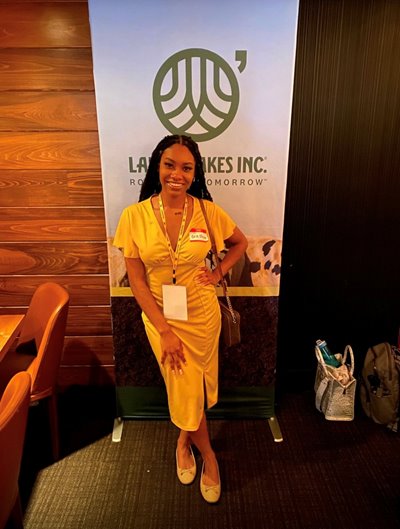
Future of feeding the world relies on diverse ag workforce
What’s the adult version of the question, “What do you want be when you grow up?” Some might argue it is, “What do you want to major in college?”
Choosing a major is one of the most important, but stressful decisions students make in college and will influence every student’s future career path.
About two years ago, 19-year-old Aria Alridge was facing this common dilemma among high school seniors after getting accepted to Tuskegee University in Alabama. Aria says when she initially applied to the college, she thought she wanted to pursue a nursing degree.
“I wanted to be a nursing major mostly because I knew it was an industry that paid well. But when I started to do more research, I decided I wanted to major in something I was interested in and have a career where I enjoyed what I did,” Aria says.
Shortly after, Aria connected with Dr. Warren Buchanan, Special Assistant to the Dean and Director of Student Placement and Assessment for USDA Research and Extension Projects at Tuskegee. Aria says she told Dr. Buchanan her concerns about nursing, and he suggested she look into the university’s College of Agriculture because of the many scholarship and career opportunities.
.jpg?lang=en-US&width=400&height=533)
“At first, I thought agriculture was just farmers growing food and selling it at the grocery store. When I started researching the industry and having conversations with my family, I quickly realized ag is an open industry with a ton of opportunities. Even though I didn’t know what I’d do with an ag degree yet, I decided I could give it a try and immerse myself in the plethora of agriculture opportunities at Tuskegee to figure it out,” Aria says.
So that’s exactly what Aria did. During her first semester of college, she majored in Agricultural Business and also joined the university’s Minorities in Agriculture, Natural Resources and Related Sciences (MANRRS) chapter. At the collegiate level, MANRRS provides access to valuable connections, internships, conferences and opportunities for students pursuing degrees in science, technology, engineering, agriculture and mathematics.
As a MANRRS member, Aria learned about the new Rooted in Tomorrow Land O’Lakes Scholarship. It is designed for 10, rising sophomore undergraduate students who are active members of the MANRRS organization. Along with receiving $1,000, selected scholars get to spend a week in June at the Land O’Lakes headquarters to connect and network with Land O’Lakes professionals, MANRRS alumni, College Relations staff and summer interns.
.jpg?lang=en-US&width=400&height=521)
As part of her application, Aria wrote an essay about how she went into college having no idea what she wanted to do with her career. However, through joining MANRRS, she was able to connect with people throughout the ag industry, and now wanted to be a part of the solution to help feed a rapidly growing population. A few months later, Aria found out she was one of the 10 scholars chosen for the scholarship and would soon get to spend a week at the Land O’Lakes headquarters. Not only did the group get to visit the corporate office, but the week was also filled with a tour of a local member farm an Answer Plot, as well as a trip to the WinField United Innovation Center in River Falls, Wisconsin.
“The week was so fun and hands-on. It was an eye-opening experience to see so many different areas of agriculture. From meeting dairy farmers who supply milk for dairy products to the scientists testing new technology and methods to help farmers grow more food more sustainably,” Aria says.
Aria says the most impactful part of the trip was a session with Land O’Lakes, Inc.’s Chief Supply Chain Officer Yone Dewberry.

“Hearing from him really resonated with me and inspired me to explore careers in supply chain. Following that trip, I applied for and landed a 2024 summer internship at a Land O’Lakes manufacturing facility in Statesville, North Carolina. I’m excited for the upcoming opportunity and to see where it takes me in the future,” Aria says.
For now, Aria is focused on finishing out her sophomore year at Tuskegee University and continuing to serve as an ambassador for MANRRS. She says more diversity within the ag industry will play a critical role in feeding a projected 10 billion people by 2050.
.jpg?lang=en-US&width=400&height=533)
“It’s important to have more diverse people who think differently to give perspective on how to make things better. I remember going to the NASDA Ag Summit last winter and not seeing a lot of people who looked like me. Minorities in ag are not going to feel as connected to the Farm Bill or other initiatives presented to them if there’s no one who looks like them creating the rules,” Aria says.

Share